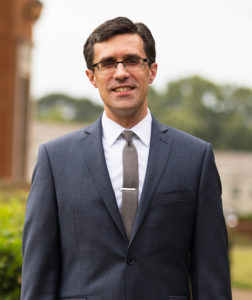
How to Read 1 & 2 Thessalonians Theologically
In all likelihood, the first surviving letters written by the apostle Paul were to the church in Thessalonica. As he recounts in 1 Thess 2:17-3:5, Paul had been driven from Thessalonica by enemies of the gospel. These verses testify to the anguish and concern that Paul was experiencing as he left this young body of believers in the crucible of persecution. But in the verses that follow (1 Thess 3:6-13), Paul’s mood reflects the joy he experienced when Timothy brought to him the “good news” of the Thessalonians’ “faith and love” (3:6). It was to encourage the Thessalonians, recently converted from paganism, to persevere in their young faith that Paul wrote these two letters.
What did a body of new believers need to hear? They needed to hear the gospel. It was through the gospel that the church in Thessalonica had come to faith. It would be through the gospel that the church in Thessalonica would grow in faith. And the gospel, according to Paul, is a message centered upon the triune God – one God in three persons, Father, Son, and Spirit.
These two letters afford rich reflection upon the triune God. We may trace four lines of teaching about the Trinity from these two letters. And then we may draw some implications from these letters about the place of theology in Scripture and in the Christian life.
The Trinity in Thessalonians
First, and most basically, Paul affirms that there is but one God. A minority of Pauline scholars argues that Paul, like most people in antiquity, was a polytheist. But the letters to the Thessalonians offer some of Paul’s most strongly worded affirmations of monotheism. In 1 Thess 1:9, Paul reminds the church that they had “turned to God from idols to serve the living and true God…” Formerly, the Thessalonians had been idol worshippers. That condition had been one of spiritual slavery (see Gal 4:9). But they had “turned,” that is, they were converted by God (see 2 Cor 3:16). The service they now offer is no longer to idols. It is “the living and true God,” alone and exclusively, whom the Thessalonians now serve. And who is this God? Paul’s description of him as “living and true” reminds us of Jeremiah’s words, “But the Lord God is the true God; he is the living God and the everlasting King” (Jer 10:10). This God is none other than YHWH, the God of Israel. We serve one God alone, the God of Abraham, Isaac, and Jacob, the God who is living and true. All other gods are idols, dead and false.
Second, Paul affirms Jesus to be God. He does this in many ways. We may mention three. First, Paul says that Jesus is in unique relationship with God. Thus, the church is “in God the Father and the Lord Jesus Christ” (1 Thess 1:1; compare 2 Thess 1:1). To set Jesus alongside the Father in this way indicates their equality of nature – Jesus is God. Note that within this unity there is diversity – Paul speaks of God as “the Father” (1:1) and, a little later, Jesus as “his Son” (1:10). Second, Paul addresses Jesus in prayer as well as God the Father. Jesus along with the Father receives the prayers of believers, “Now may our God and Father himself, and our Lord Jesus, direct our way to you, and may the Lord make you increase and abound in love…so that he may establish your hearts blameless in holiness before God our Father, at the coming of our Lord Jesus with all his saints” (1 Thess 3:11-13; compare 2 Thess 2:16-17). Since God alone receives prayer, and since there is one God, Jesus is therefore identified with the one God. But here also, Paul recognizes a plurality of persons within the Godhead – there is God the Father and there is God the Son. Third, Paul confesses that both the Father and Jesus will judge humanity. At 2 Thess 1:5, Paul speaks of the “righteous judgment of God.” It is God who will “repay with affliction those who repay you, and grant relief to you who are afflicted as well as to us” (1:6-7). Then Paul begins to speak about Jesus as the one who “inflicts vengeance at the last day” – he will consign some to “suffer the punishment of eternal destruction, away from the presence of the Lord and from the glory of his might” even as he will be glorified in his saints, to be marveled at among all who have believed” (1:9,10). Once again, Paul identifies Jesus with God as the one who will bring all people into judgment, even as he personally distinguishes God the Father (“God”) and God the Son (“the Lord Jesus”) with respect to that work.
Third, Paul affirms the Holy Spirit to be God. He does this through two intertwined lines of teaching. First, Paul speaks of the personality of the Spirit. The Spirit’s work lies particularly in the domain of sanctification (See 1 Thess 4:8, 2 Thess 2:13). It is in that context that Paul tells us not to “quench the Spirit” (1 Thess 5:19). The Spirit is not a mechanical or automatic force (an “it”). He responds to actions of ours that displease him. He is therefore personal (a “he”). Second, Paul speaks of the deity of the Spirit. Notice that, in 2 Thess 2:13, it is the Spirit who sanctifies us, and in 1 Thess 5:23, it is the “God of peace himself” who sanctifies us. For the Spirit to sanctify us is for God to sanctify us. This is because Paul identifies the Spirit with God (even as he personally distinguishes the Father and the Spirit at 1 Thess 4:8). The Trinity is not an advanced lesson that Paul reserves for a select set of mature believers. It is entry level teaching for all Christians. Click To Tweet
Fourth, Paul sets Father, Son, and Spirit in mutual relation. Each of these three persons is God, and there is but one God. This one God exists eternally in three persons. Our triune God, moreover, has undertaken the work of our salvation in a way that reflects his triunity. In 1 Thess 1:4-5 (“for we know, brothers, loved by God, that he has chosen you, because our gospel came to you not only in word, but also in power and in the Holy Spirit and with full conviction”), Paul tells us that it is God the Father who has chosen us in love. The mention of “gospel” calls to mind the death and resurrection of the God-man, Jesus Christ. And it is the Spirit, Paul says, who attends the preaching of the gospel with power. We see the same pattern in 2 Thess 2:13 – the Father has chosen us; the Son has loved us; and the Spirit sanctifies us. In both passages, Paul points us to the Father as the one who has planned our salvation, the Son as the one who has accomplished our salvation, and the Spirit as the one who executes or applies our salvation. The triunity of the one God appears in the way that Paul attributes aspects of our salvation preeminently to one or the other of the persons of the Godhead.
An Explicitly Theological Foundation
What does Paul’s teaching about the triunity of God in 1-2 Thess tell us about the place of theology in Scripture and the Christian life? In the first place, Paul is laying an explicitly theological foundation for the lives of new Christian believers. Every believer, he is saying, needs to understand who God is and what he does for his people. And to understand God, we need to understand his triunity. The Trinity is not an advanced lesson that Paul reserves for a select set of mature believers. It is entry level teaching for all Christians. We need to be able to explain the Trinity in our evangelism (Paul, after all, is summarizing in these letters the gospel that he had preached to the Thessalonians). We need to be able to explain the Trinity in our work of discipleship.
Second, the Trinity, for Paul, is no speculative affair. The doctrine is eminently practical. It arises organically from Paul’s teaching about our salvation from sin. It surfaces in Paul’s teaching about sexual integrity (see 1 Thess 4:6,7,8). We could multiply examples, but the point is plain enough – the triunity of God permeates all of the apostle’s teaching. And how could it not? After all, our hope is that, when Christ returns, “we will always be with the Lord” (1 Thess 4:17) – and, with him, God the Father and God the Spirit. We don’t want to lose any time getting to know the triune God in whose blessed presence we will dwell forever!

